The portly, versatile British-American stage and film actor Charles Laughton (1899–1962) was one of the most popular actors of the 1930s and 1940s. He gave great performances as Nero, Henry VIII, Inspector Javert, Captain Bligh, Rembrandt, Quasimodo, and of course as Ruggles, the British butler who is brought to the Wild, Wild West.

Vintage postcard. Photo: Paramount. Publicity still for Ruggles of Red Gap (1935).

British postcard by Milton, no. 44. Photo: Paramount Pictures.

German postcard by Das Programm von Heute für Film und Theater. Charles Laughton in The Private Life of Henry VIII (Alexander Korda, 1933).

French postcard by A.N., Paris, no. 1026. Photo: Metro-Goldwyn-Mayer (MGM).

Dutch postcard, no. 705. Photo: Metro-Goldwyn-Mayer. Publicity still for Mutiny on the Bounty (1935).
Charles Laughton was born to a wealthy hotel-owning family in Scarborough, England, in 1899. He was the son of Robert Laughton and his wife Elizabeth Conlon, who was a devout Roman Catholic. They ran the Victoria Hotel, a well-known retreat for the middle class. Laughton and his two younger brothers thrived in the spacious hotel, always finding new places to play. Laughton attended Stonyhurst College, a Jesuit school, in Lancashire, England. He was assigned the role of a portly innkeeper in the school’s production of 'The Private Secretary'. Even though the role was a minor one, he loved the opportunity to let out his artistic flair. In 1917, just 18 he was sent onto the battlefields of Europe. He joined the war at its conclusion, but nonetheless suffered not only a gas attack but also some deep mental scars.
He started work in the family hotel business while participating in amateur theatricals in Scarborough. Finally, he was allowed by his family to become a drama student at the Royal Academy of Dramatic Art (RADA) in 1925, where he received the gold medal. Laughton made his stage début in 1926 at the Barnes Theatre, as Osip in Gogol's comedy 'The Government Inspector', in which he also appeared at the London Gaiety Theatre. In the following years, he appeared in many West End productions. Overweight and not the best-looking of men, many of the leading roles were not available to him. Despite this he impressed audiences with his talent and played classical roles in two plays by Anton Chekhov, 'The Cherry Orchard' and 'The Three Sisters'.
One of his earliest stage successes was as Hercule Poirot in 'Alibi' (1928), a stage adaptation of 'The Murder of Roger Ackroyd'. In fact, he was the first actor to portray Agatha Christie's Belgian detective. That same year Laughton also played the lead role of Harry Hegan in the world première of Sean O'Casey's 'The Silver Tassie' in London, and he played the title role in Arnold Bennett's 'Mr Prohack'. Elsa Lanchester was also in the cast. Coming from a bohemian background, Lanchester was lively and strong-willed. She fell for the reserved and sensitive Laughton and despite his suppressed feelings of homosexuality, the two began a courtship. In 1929 they married.
Laughton went on to play the title role in 'Mr Pickwick' after Charles Dickens, and Tony Perelli in Edgar Wallace's 'On the Spot'. Another success was his role as William Marble in 'Payment Deferred'. He took this last play across the Atlantic and in it, he made his American début in 1931, at the Lyceum Theatre in New York. He returned to London for the 1933-1934 Old Vic Season and was engaged in four Shakespeare roles. In 1936, he went to Paris and appeared at the Comédie-Française as Sganarelle in the second act of Molière's 'Le Médecin malgré lui'. He was the first English actor to appear at that theatre, acted the part in French and received an ovation.
Laughton commenced his film career in England while still acting on the London stage. He took small roles in three short silent comedies starring his wife Elsa Lanchester, Daydreams (Ivor Montagu, 1928), Blue Bottles (Ivor Montagu, 1928) and The Tonic (Ivor Montagu, 1928) which had been specially written for her by H. G. Wells. He made a brief appearance as a disgruntled diner in another silent film Piccadilly (Ewald André Dupont, 1929) with Anna May Wong. Laughton appeared with Elsa Lanchester again in Comets (Sasha Geneen, 1930), featuring assorted British variety acts. In this ‘film revue’ they duetted in 'The Ballad of Frankie and Johnnie'. The couple made two other early British talkies: Wolves (Albert de Courville, 1930) with Dorothy Gish from a play set in a whaling camp in the frozen north, and Down River (Peter Godfrey, 1931) in which he played a murderous, half-oriental drug-smuggler.

British postcard in the Picturegoer Series, London, no. 725a. Photo: Paramount.
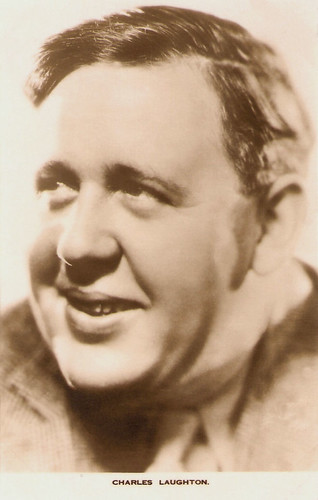
British postcard.
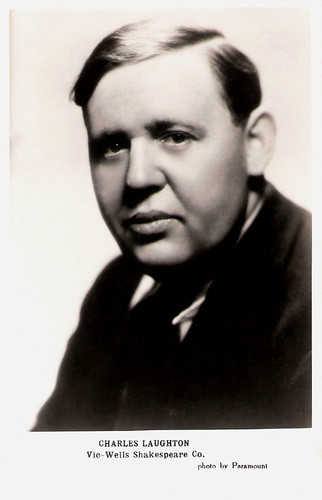
British postcard. Photo: Paramount. Caption: Vic-Wells Shakespeare Co.
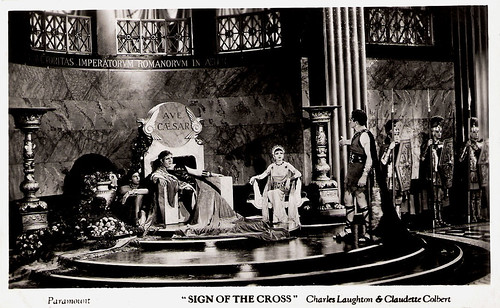
British postcard in the series Film Shots by Film Weekly. Photo: Paramount. publicity still of The Sign of the Cross (Cecil B. De Mille, 1932) with Claudette Colbert.

British postcard. Photo: London Film. Charles Laughton in The Private Life of Henry VIII (Alexander Korda, 1933).
Charles Laughton’s New York stage début in 1931 immediately led to film offers and Laughton's first Hollywood film was the classic horror comedy The Old Dark House (James Whale, 1932) with Boris Karloff. Laughton played a bluff Yorkshire businessman marooned during a storm with other travellers in a creepy mansion in the Welsh mountains. In the Encyclopedia of British Film, Anthony Slide calls it Laughton’s ‘greatest work in the US’. He then played a demented submarine commander in The Devil and the Deep (Marion Gering, 1932) with Tallulah Bankhead, Gary Cooper and Cary Grant and followed this with his famous role as the perverted Nero in The Sign of the Cross (Cecil B. DeMille, 1932). He then repeated his stage role as a murderer in Payment Deferred (Lothar Mendes, 1932), played H. G. Wells's mad vivisectionist Dr. Moreau in Island of Lost Souls (Erle C. Kenton, 1932), and the meek raspberry-blowing clerk in the brief segment of If I Had a Million (1932) that was directed by Ernst Lubitsch.
In all, he appeared in six Hollywood films during 1932, a remarkable movie 'apprenticeship' which set him on course for instant international stardom. His association with film director Alexander Korda began with The Private Life of Henry VIII (1933), loosely based on the life of King Henry VIII of England. Laughton won an Academy Award for his role, the first British actor to do so. He continued to act occasionally in the theatre. After the success of The Private Life of Henry VIII, he appeared at the Old Vic Theatre in 1933 in roles as Macbeth, Lopakin in The Cherry Orchard, Prospero in The Tempest and Angelo in Measure for Measure. His 1947 American production of a new English version of Bertolt Brecht's play Galileo became legendary. Laughton played the title role at the play's premiere in Los Angeles on 30 July 1947 and later that year in New York. This staging was directed by Joseph Losey.
Laughton preferred a film career though and in 1933 he returned to Hollywood where his next film was White Woman (Stuart Walker, 1933) in which he co-starred with Carole Lombard as a cockney river trader in the Malaysian jungle. Then came The Barretts of Wimpole Street (Sidney Franklin, 1934) as Norma Shearer's overbearing father, Les Misérables (Richard Boleslawski, 1935) as inspector Javert, and Ruggles of Red Gap (Leo McCarey, 1935) as the very English and selfless butler transported to early 1900s America. One of his most famous screen roles was Captain William Bligh in Mutiny on the Bounty (Frank Lloyd, 1935), co-starring with Clark Gable as Fletcher Christian. Back in England, and again with Alexander Korda, he played the title role in Rembrandt (1936). In 1937, also for Korda, he starred in an ill-fated film version of Robert Graves’ classic novel, I, Claudius (Josef von Sternberg, 1937), which was abandoned during filming owing to the injuries suffered by co-star Merle Oberon in a car crash.
After I, Claudius, he and the ex-pat German film producer Erich Pommer founded the production company Mayflower Pictures in the UK, which produced three films starring Laughton: Vessel of Wrath/The Beachcomber (Erich Pommer, 1938), based on a story by W. Somerset Maugham, with Elsa Lanchester; St. Martin's Lane/Sidewalks of London (Tim Whelan, 1938), a story about London street entertainers that also featured Vivien Leigh and Rex Harrison; and Jamaica Inn (Alfred Hitchcock, 1939), with Maureen O'Hara. The latter was based on a novel about Cornish smugglers by Daphne du Maurier, and it was the last film Alfred Hitchcock directed in Britain before moving to Hollywood in the late 1930s.
The films produced were not successful enough, and the company was saved from bankruptcy when RKO Pictures offered Laughton the title role of Quasimodo in The Hunchback of Notre Dame (1939) directed by William Dieterle. Laughton and Pommer had plans to make further films, but the outbreak of World War II, which implied the loss of many foreign markets, meant the end of the company.

British Valentine's postcard, no. 7179.
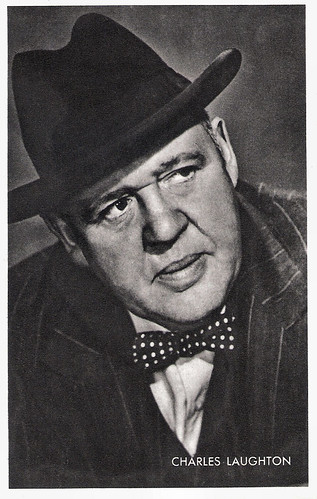
Belgian collectors card by Kwatta, Bois d'Haine, no. C. 152. Photo: Metro Goldwyn Mayer. Publicity still for Arch of Triumph (Lewis Milestone, 1948).
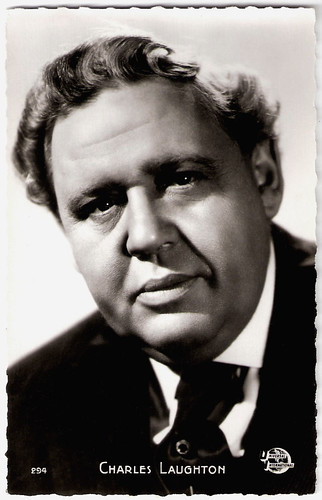
French postcard by Editions P.I., Paris, no. 294. Photo: Universal International.

French postcard by Editions P.I., Paris, no. 294. Photo: Universal International.
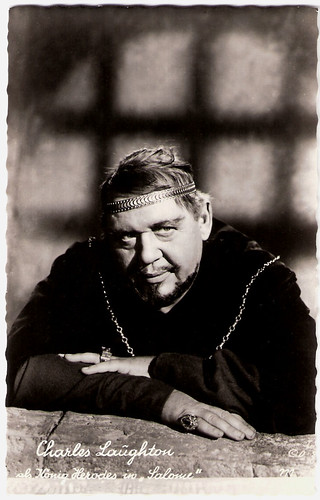
Austrian postcard by Verlag Hubmann (HDH Verlag), Wien (Vienna), no. 3390. Photo: publicity still for Salome (William Dieterle, 1953) with Charles Laughton as King Herod.
Although the 1930s were Charles Laughton’s best cinematic years, there were also some remarkable post-1930s performances. An example is the cowardly schoolmaster in occupied France in This Land is Mine (Jean Renoir, 1943). He played a modest, henpecked husband who eventually murdered his wife in The Suspect (1944), directed by Robert Siodmak, who later became a good friend of Laughton. He played sympathetically an impoverished composer-pianist in Tales of Manhattan (Julien Duvivier, 1942) and starred in an updated version of Oscar Wilde's The Canterville Ghost (Jules Dassin, 1944). Apart from these, he would enjoy his work in the two comedies he made with Deanna Durbin, It Started with Eve (Henry Koster, 1941) and Because of Him (Richard Wallace, 1946). He portrayed a bloodthirsty pirate in Captain Kidd (Rowland V. Lee, 1945) and a malevolent judge in Alfred Hitchcock's The Paradine Case (1948) with Alida Valli. Laughton played a megalomaniac press tycoon in The Big Clock (John Farrow, 1948) starring Ray Milland. Laughton made his first colour film in Paris as Inspector Maigret in The Man on the Eiffel Tower (Burgess Meredith, 1949).
In 1950, Laughton and Lanchester became American citizens. In one of his funniest roles of the 1950s, he played a tramp in O. Henry's Full House (Henry Koster a.o., 1952), in which he had a one-minute scene with Marilyn Monroe. In later years he was frequently accused by the critics of hamming, although he remained a popular star. He became a pirate again, buffoon style this time, in Abbott and Costello Meet Captain Kidd (Charles Lamont, 1952). He guest-starred in an episode of the Colgate Comedy Hour on TV that also featured Abbott and Costello and that was notable for his delivery of the Gettysburg Address. He played Herod Antipas in Salome (William Dieterle, 1953) with Rita Hayworth in the title role, and repeated his role as Henry VIII in Young Bess (George Sidney, 1953) starring Jean Simmons. He returned to England for a memorable turn in Hobson's Choice (David Lean, 1954) as the patriarch brought to heel opposite John Mills.
Laughton directed several plays on Broadway. His most notable box-office success as a director came in 1954, with The Caine Mutiny Court-Martial, a full-length stage dramatisation by Herman Wouk of the court-martial scene in Wouk's novel The Caine Mutiny. In 1955, Laughton directed (but did not act in) the film The Night of the Hunter. This poetic thriller has become a critical and cult favourite thanks to Laughton's intriguing combination of expressionism and realism, a fine script co-written by James Agee and compelling performances by an excellent cast headed by Robert Mitchum as a psychotic preacher and Lillian Gish as a resolute farm woman. At the time of its original release, however, it was a critical and box-office failure, and Laughton never had another chance to direct a film.
Laughton received Academy Award and Golden Globe nominations for his role as Sir Wilfrid Robarts in the screen version of Agatha Christie's play Witness for the Prosecution (Billy Wilder, 1957) with Marlene Dietrich. He played a British admiral in the Italian war film Sotto dieci bandiere/Under Ten Flags (Duilio Coletti, 1960) and worked for the only time with Laurence Olivier in Spartacus (Stanley Kubrick, 1960) as a wily Roman senator. He also gave highly successful one-man reading tours for many years. His material ranged from the Bible to Jack Kerouac's The Dharma Bums. His final film was Advise and Consent (Otto Preminger, 1962), for which he received favourable comments for his performance as a southern US Senator (for which accent he studied recordings of Mississippi Senator John Stennis).
Charles Laughton worked on the film, while he was dying. In January 1962 he had been diagnosed with cancer after being hospitalised with a collapsed vertebrae following a fall in the bath. Over his final eleven months, his weight dropped to just ninety pounds. Following Laughton's death in 1962, Laughton's wife Elsa Lanchester wrote a memoir in which she stated that they never had children because Laughton was actually homosexual. The lesbian and gay Fyne Times wrote about the couple: “Only two years into the marriage, Lanchester learnt of her husband’s homosexuality. Although she was initially shocked and deeply upset, over time the couple began to develop an altered relationship, one of close friendship. They decided to remain married, although both of them took lovers, and were instead constant companions, looking after and supporting each other as in any other marriage.”

Vintage postcard. Photo: Columbia. Charles Laughton, Rita Hayworth, and Stewart Granger in Salome (William Dieterle, 1953).
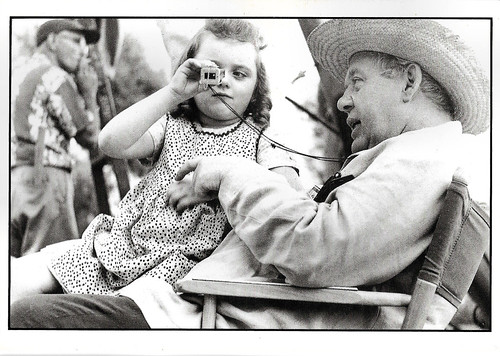

Vintage postcard. Photo: Paramount. Publicity still for Ruggles of Red Gap (1935).

British postcard by Milton, no. 44. Photo: Paramount Pictures.

German postcard by Das Programm von Heute für Film und Theater. Charles Laughton in The Private Life of Henry VIII (Alexander Korda, 1933).

French postcard by A.N., Paris, no. 1026. Photo: Metro-Goldwyn-Mayer (MGM).

Dutch postcard, no. 705. Photo: Metro-Goldwyn-Mayer. Publicity still for Mutiny on the Bounty (1935).
Overweight and not the best-looking of men
Charles Laughton was born to a wealthy hotel-owning family in Scarborough, England, in 1899. He was the son of Robert Laughton and his wife Elizabeth Conlon, who was a devout Roman Catholic. They ran the Victoria Hotel, a well-known retreat for the middle class. Laughton and his two younger brothers thrived in the spacious hotel, always finding new places to play. Laughton attended Stonyhurst College, a Jesuit school, in Lancashire, England. He was assigned the role of a portly innkeeper in the school’s production of 'The Private Secretary'. Even though the role was a minor one, he loved the opportunity to let out his artistic flair. In 1917, just 18 he was sent onto the battlefields of Europe. He joined the war at its conclusion, but nonetheless suffered not only a gas attack but also some deep mental scars.
He started work in the family hotel business while participating in amateur theatricals in Scarborough. Finally, he was allowed by his family to become a drama student at the Royal Academy of Dramatic Art (RADA) in 1925, where he received the gold medal. Laughton made his stage début in 1926 at the Barnes Theatre, as Osip in Gogol's comedy 'The Government Inspector', in which he also appeared at the London Gaiety Theatre. In the following years, he appeared in many West End productions. Overweight and not the best-looking of men, many of the leading roles were not available to him. Despite this he impressed audiences with his talent and played classical roles in two plays by Anton Chekhov, 'The Cherry Orchard' and 'The Three Sisters'.
One of his earliest stage successes was as Hercule Poirot in 'Alibi' (1928), a stage adaptation of 'The Murder of Roger Ackroyd'. In fact, he was the first actor to portray Agatha Christie's Belgian detective. That same year Laughton also played the lead role of Harry Hegan in the world première of Sean O'Casey's 'The Silver Tassie' in London, and he played the title role in Arnold Bennett's 'Mr Prohack'. Elsa Lanchester was also in the cast. Coming from a bohemian background, Lanchester was lively and strong-willed. She fell for the reserved and sensitive Laughton and despite his suppressed feelings of homosexuality, the two began a courtship. In 1929 they married.
Laughton went on to play the title role in 'Mr Pickwick' after Charles Dickens, and Tony Perelli in Edgar Wallace's 'On the Spot'. Another success was his role as William Marble in 'Payment Deferred'. He took this last play across the Atlantic and in it, he made his American début in 1931, at the Lyceum Theatre in New York. He returned to London for the 1933-1934 Old Vic Season and was engaged in four Shakespeare roles. In 1936, he went to Paris and appeared at the Comédie-Française as Sganarelle in the second act of Molière's 'Le Médecin malgré lui'. He was the first English actor to appear at that theatre, acted the part in French and received an ovation.
Laughton commenced his film career in England while still acting on the London stage. He took small roles in three short silent comedies starring his wife Elsa Lanchester, Daydreams (Ivor Montagu, 1928), Blue Bottles (Ivor Montagu, 1928) and The Tonic (Ivor Montagu, 1928) which had been specially written for her by H. G. Wells. He made a brief appearance as a disgruntled diner in another silent film Piccadilly (Ewald André Dupont, 1929) with Anna May Wong. Laughton appeared with Elsa Lanchester again in Comets (Sasha Geneen, 1930), featuring assorted British variety acts. In this ‘film revue’ they duetted in 'The Ballad of Frankie and Johnnie'. The couple made two other early British talkies: Wolves (Albert de Courville, 1930) with Dorothy Gish from a play set in a whaling camp in the frozen north, and Down River (Peter Godfrey, 1931) in which he played a murderous, half-oriental drug-smuggler.

British postcard in the Picturegoer Series, London, no. 725a. Photo: Paramount.

British postcard.

British postcard. Photo: Paramount. Caption: Vic-Wells Shakespeare Co.

British postcard in the series Film Shots by Film Weekly. Photo: Paramount. publicity still of The Sign of the Cross (Cecil B. De Mille, 1932) with Claudette Colbert.

British postcard. Photo: London Film. Charles Laughton in The Private Life of Henry VIII (Alexander Korda, 1933).
On course for instant international stardom
Charles Laughton’s New York stage début in 1931 immediately led to film offers and Laughton's first Hollywood film was the classic horror comedy The Old Dark House (James Whale, 1932) with Boris Karloff. Laughton played a bluff Yorkshire businessman marooned during a storm with other travellers in a creepy mansion in the Welsh mountains. In the Encyclopedia of British Film, Anthony Slide calls it Laughton’s ‘greatest work in the US’. He then played a demented submarine commander in The Devil and the Deep (Marion Gering, 1932) with Tallulah Bankhead, Gary Cooper and Cary Grant and followed this with his famous role as the perverted Nero in The Sign of the Cross (Cecil B. DeMille, 1932). He then repeated his stage role as a murderer in Payment Deferred (Lothar Mendes, 1932), played H. G. Wells's mad vivisectionist Dr. Moreau in Island of Lost Souls (Erle C. Kenton, 1932), and the meek raspberry-blowing clerk in the brief segment of If I Had a Million (1932) that was directed by Ernst Lubitsch.
In all, he appeared in six Hollywood films during 1932, a remarkable movie 'apprenticeship' which set him on course for instant international stardom. His association with film director Alexander Korda began with The Private Life of Henry VIII (1933), loosely based on the life of King Henry VIII of England. Laughton won an Academy Award for his role, the first British actor to do so. He continued to act occasionally in the theatre. After the success of The Private Life of Henry VIII, he appeared at the Old Vic Theatre in 1933 in roles as Macbeth, Lopakin in The Cherry Orchard, Prospero in The Tempest and Angelo in Measure for Measure. His 1947 American production of a new English version of Bertolt Brecht's play Galileo became legendary. Laughton played the title role at the play's premiere in Los Angeles on 30 July 1947 and later that year in New York. This staging was directed by Joseph Losey.
Laughton preferred a film career though and in 1933 he returned to Hollywood where his next film was White Woman (Stuart Walker, 1933) in which he co-starred with Carole Lombard as a cockney river trader in the Malaysian jungle. Then came The Barretts of Wimpole Street (Sidney Franklin, 1934) as Norma Shearer's overbearing father, Les Misérables (Richard Boleslawski, 1935) as inspector Javert, and Ruggles of Red Gap (Leo McCarey, 1935) as the very English and selfless butler transported to early 1900s America. One of his most famous screen roles was Captain William Bligh in Mutiny on the Bounty (Frank Lloyd, 1935), co-starring with Clark Gable as Fletcher Christian. Back in England, and again with Alexander Korda, he played the title role in Rembrandt (1936). In 1937, also for Korda, he starred in an ill-fated film version of Robert Graves’ classic novel, I, Claudius (Josef von Sternberg, 1937), which was abandoned during filming owing to the injuries suffered by co-star Merle Oberon in a car crash.
After I, Claudius, he and the ex-pat German film producer Erich Pommer founded the production company Mayflower Pictures in the UK, which produced three films starring Laughton: Vessel of Wrath/The Beachcomber (Erich Pommer, 1938), based on a story by W. Somerset Maugham, with Elsa Lanchester; St. Martin's Lane/Sidewalks of London (Tim Whelan, 1938), a story about London street entertainers that also featured Vivien Leigh and Rex Harrison; and Jamaica Inn (Alfred Hitchcock, 1939), with Maureen O'Hara. The latter was based on a novel about Cornish smugglers by Daphne du Maurier, and it was the last film Alfred Hitchcock directed in Britain before moving to Hollywood in the late 1930s.
The films produced were not successful enough, and the company was saved from bankruptcy when RKO Pictures offered Laughton the title role of Quasimodo in The Hunchback of Notre Dame (1939) directed by William Dieterle. Laughton and Pommer had plans to make further films, but the outbreak of World War II, which implied the loss of many foreign markets, meant the end of the company.

British Valentine's postcard, no. 7179.

Belgian collectors card by Kwatta, Bois d'Haine, no. C. 152. Photo: Metro Goldwyn Mayer. Publicity still for Arch of Triumph (Lewis Milestone, 1948).

French postcard by Editions P.I., Paris, no. 294. Photo: Universal International.

French postcard by Editions P.I., Paris, no. 294. Photo: Universal International.

Austrian postcard by Verlag Hubmann (HDH Verlag), Wien (Vienna), no. 3390. Photo: publicity still for Salome (William Dieterle, 1953) with Charles Laughton as King Herod.
The Night of the Hunter
Although the 1930s were Charles Laughton’s best cinematic years, there were also some remarkable post-1930s performances. An example is the cowardly schoolmaster in occupied France in This Land is Mine (Jean Renoir, 1943). He played a modest, henpecked husband who eventually murdered his wife in The Suspect (1944), directed by Robert Siodmak, who later became a good friend of Laughton. He played sympathetically an impoverished composer-pianist in Tales of Manhattan (Julien Duvivier, 1942) and starred in an updated version of Oscar Wilde's The Canterville Ghost (Jules Dassin, 1944). Apart from these, he would enjoy his work in the two comedies he made with Deanna Durbin, It Started with Eve (Henry Koster, 1941) and Because of Him (Richard Wallace, 1946). He portrayed a bloodthirsty pirate in Captain Kidd (Rowland V. Lee, 1945) and a malevolent judge in Alfred Hitchcock's The Paradine Case (1948) with Alida Valli. Laughton played a megalomaniac press tycoon in The Big Clock (John Farrow, 1948) starring Ray Milland. Laughton made his first colour film in Paris as Inspector Maigret in The Man on the Eiffel Tower (Burgess Meredith, 1949).
In 1950, Laughton and Lanchester became American citizens. In one of his funniest roles of the 1950s, he played a tramp in O. Henry's Full House (Henry Koster a.o., 1952), in which he had a one-minute scene with Marilyn Monroe. In later years he was frequently accused by the critics of hamming, although he remained a popular star. He became a pirate again, buffoon style this time, in Abbott and Costello Meet Captain Kidd (Charles Lamont, 1952). He guest-starred in an episode of the Colgate Comedy Hour on TV that also featured Abbott and Costello and that was notable for his delivery of the Gettysburg Address. He played Herod Antipas in Salome (William Dieterle, 1953) with Rita Hayworth in the title role, and repeated his role as Henry VIII in Young Bess (George Sidney, 1953) starring Jean Simmons. He returned to England for a memorable turn in Hobson's Choice (David Lean, 1954) as the patriarch brought to heel opposite John Mills.
Laughton directed several plays on Broadway. His most notable box-office success as a director came in 1954, with The Caine Mutiny Court-Martial, a full-length stage dramatisation by Herman Wouk of the court-martial scene in Wouk's novel The Caine Mutiny. In 1955, Laughton directed (but did not act in) the film The Night of the Hunter. This poetic thriller has become a critical and cult favourite thanks to Laughton's intriguing combination of expressionism and realism, a fine script co-written by James Agee and compelling performances by an excellent cast headed by Robert Mitchum as a psychotic preacher and Lillian Gish as a resolute farm woman. At the time of its original release, however, it was a critical and box-office failure, and Laughton never had another chance to direct a film.
Laughton received Academy Award and Golden Globe nominations for his role as Sir Wilfrid Robarts in the screen version of Agatha Christie's play Witness for the Prosecution (Billy Wilder, 1957) with Marlene Dietrich. He played a British admiral in the Italian war film Sotto dieci bandiere/Under Ten Flags (Duilio Coletti, 1960) and worked for the only time with Laurence Olivier in Spartacus (Stanley Kubrick, 1960) as a wily Roman senator. He also gave highly successful one-man reading tours for many years. His material ranged from the Bible to Jack Kerouac's The Dharma Bums. His final film was Advise and Consent (Otto Preminger, 1962), for which he received favourable comments for his performance as a southern US Senator (for which accent he studied recordings of Mississippi Senator John Stennis).
Charles Laughton worked on the film, while he was dying. In January 1962 he had been diagnosed with cancer after being hospitalised with a collapsed vertebrae following a fall in the bath. Over his final eleven months, his weight dropped to just ninety pounds. Following Laughton's death in 1962, Laughton's wife Elsa Lanchester wrote a memoir in which she stated that they never had children because Laughton was actually homosexual. The lesbian and gay Fyne Times wrote about the couple: “Only two years into the marriage, Lanchester learnt of her husband’s homosexuality. Although she was initially shocked and deeply upset, over time the couple began to develop an altered relationship, one of close friendship. They decided to remain married, although both of them took lovers, and were instead constant companions, looking after and supporting each other as in any other marriage.”

Vintage postcard. Photo: Columbia. Charles Laughton, Rita Hayworth, and Stewart Granger in Salome (William Dieterle, 1953).

French postcard in the Entr'acte series by Éditions Asphodèle, Mâcon, no. 001/06. Charles Laughton and Sally Jane Bruce on the set of The Night of the Hunter (Charles Laughton, 1955). Caption: Sally Jane Bruce, star of The Night of the Hunter, on Charles Laughton's lap, learns about framing.
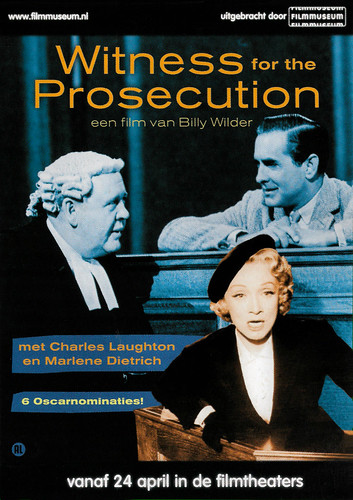
Dutch postcard by Filmmuseum, Amsterdam. Photo: Filmmuseum. Marlene Dietrich, Charles Laughton and Tyrone Power in Witness for the Prosecution (Billy Wilder, 1957). Caption: "I am constantly surprised that women's hats do not provoke more murders."
Chicken eating scene from The Private Life of Henry VIII (1933). Source: adam28xx's channel (YouTube).
Sources: Anthony Slide (Encyclopedia of British Film), Gloria (Rooting for Laughton), Fyne Times (Page now defunct), TCM (page now defunct), Wikipedia and IMDb.
No comments:
Post a Comment